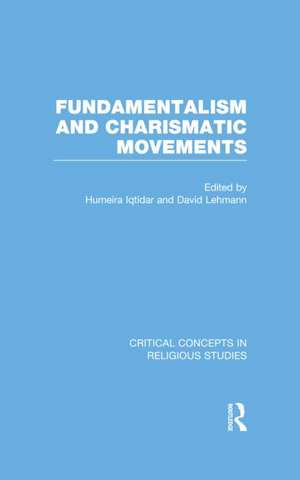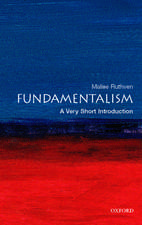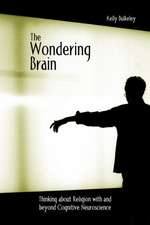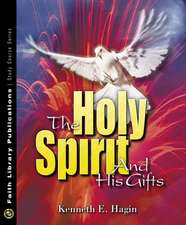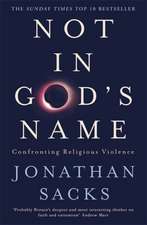Fundamentalism and Charismatic Movements: Critical Concepts in Religious Studies
Editat de David Lehmann, Humeira Iqtidaren Limba Engleză Hardback – 28 oct 2011
These three varieties of movement represent radical departures from the traditions out of which they have grown. These new forms can be characterized in terms of their ability to plug into local cultural practices and incorporate them without theorizing; ability to provide a framework for coping with serious social ills among the marginalized; ability to create transcultural communities of individuals without regard to prior political, linguistic, or ethnic frontiers; obsessive attention to the control of sexuality, especially female; belief in the literal truth of every word in the holy text; and their emphasis on conversion as a crisis and rupture in the life of individuals.
Even in its early days, Pentecostalism was a multicultural, multi-ethnic movement, drawing on black Americans, and the Mexican, European, and Asian migrant communities in America for its following. Today, in some countries (such as Nigeria and Ghana) the appeal seems to be more to the middle-class groups, while in others, such as in Latin America and the Philippines, it is most successful among the urban poor and among indigenous peoples, and represents a profound change after five centuries of a virtual Catholic monopoly.
In Islam and Judaism an erudite strand of learning has co-existed with a proliferation of healers and seers. Modern Jewish fundamentalists are however overwhelmingly focused on texts, and although their heritage in Eastern Europe has a strong element of ecstatic prayer, that has tended to take second place in the post-Holocaust era to an institutionalization of learning. In Islam, likewise, the renewal movements, led usually by lay people rather than clergy (except in Iran), focus on the text of the Qur’an and are hostile to mystical heritage embodied by Sufism.
This new, four-volume collection from Routledge makes available a range of materials which represent: (a) the most important recent analytical and descriptive contributions to the subject; (b) some doctrinal and historical texts; and (c) a representative coverage of the subject by theme and geographical area. It is sure to be welcomed by scholars and students as an indispensable resource for reference and research.
Din seria Critical Concepts in Religious Studies
- 18%
 Preț: 6808.47 lei
Preț: 6808.47 lei - 33%
 Preț: 2148.02 lei
Preț: 2148.02 lei - 33%
 Preț: 1872.22 lei
Preț: 1872.22 lei - 33%
 Preț: 1730.47 lei
Preț: 1730.47 lei - 33%
 Preț: 1564.42 lei
Preț: 1564.42 lei - 33%
 Preț: 1872.22 lei
Preț: 1872.22 lei - 34%
 Preț: 6182.05 lei
Preț: 6182.05 lei - 34%
 Preț: 5493.11 lei
Preț: 5493.11 lei - 34%
 Preț: 6176.06 lei
Preț: 6176.06 lei - 34%
 Preț: 5628.62 lei
Preț: 5628.62 lei - 34%
 Preț: 6178.39 lei
Preț: 6178.39 lei - 34%
 Preț: 6739.59 lei
Preț: 6739.59 lei - 34%
 Preț: 6180.24 lei
Preț: 6180.24 lei - 34%
 Preț: 6734.68 lei
Preț: 6734.68 lei - 34%
 Preț: 6136.37 lei
Preț: 6136.37 lei - 34%
 Preț: 6733.87 lei
Preț: 6733.87 lei - 34%
 Preț: 8131.71 lei
Preț: 8131.71 lei - 34%
 Preț: 3939.77 lei
Preț: 3939.77 lei - 34%
 Preț: 5487.00 lei
Preț: 5487.00 lei - 34%
 Preț: 6742.03 lei
Preț: 6742.03 lei - 34%
 Preț: 6136.37 lei
Preț: 6136.37 lei
Preț: 8088.17 lei
Preț vechi: 12305.32 lei
-34% Nou
Puncte Express: 12132
Preț estimativ în valută:
1547.63€ • 1620.22$ • 1280.59£
1547.63€ • 1620.22$ • 1280.59£
Carte tipărită la comandă
Livrare economică 05-19 aprilie
Preluare comenzi: 021 569.72.76
Specificații
ISBN-13: 9780415556156
ISBN-10: 0415556155
Pagini: 1696
Dimensiuni: 156 x 234 x 145 mm
Greutate: 0.64 kg
Ediția:New.
Editura: Taylor & Francis
Colecția Routledge
Seria Critical Concepts in Religious Studies
Locul publicării:Oxford, United Kingdom
ISBN-10: 0415556155
Pagini: 1696
Dimensiuni: 156 x 234 x 145 mm
Greutate: 0.64 kg
Ediția:New.
Editura: Taylor & Francis
Colecția Routledge
Seria Critical Concepts in Religious Studies
Locul publicării:Oxford, United Kingdom
Cuprins
Volume I: Issues of Definition, General Theories, and Historical Context, Volume II:
Fundamentalism, Modernity, and Globalization, Volume III:
Charismatic and Conversion Movements, Volume IV:
Fundamentalism, Politics, and Everyday Life
Fundamentalism, Modernity, and Globalization, Volume III:
Charismatic and Conversion Movements, Volume IV:
Fundamentalism, Politics, and Everyday Life
Descriere
The term ‘fundamentalism’ carries a wide range of meanings, some of them pejorative. Here it is used to refer to what the French call ‘integrism’, meaning a religious code which encompasses and governs with its prescriptions the entire private and public life of individuals and the collectivity. The prime examples in the contemporary world are Muslim renewal; Christian evangelical and charismatic churches, sects, and tendencies; and Ultra-Orthodox Judaism.
These three varieties of movement represent radical departures from the traditions out of which they have grown. These new forms can be characterized in terms of their ability to plug into local cultural practices and incorporate them without theorizing; ability to provide a framework for coping with serious social ills among the marginalized; ability to create transcultural communities of individuals without regard to prior political, linguistic, or ethnic frontiers; obsessive attention to the control of sexuality, especially female; belief in the literal truth of every word in the holy text; and their emphasis on conversion as a crisis and rupture in the life of individuals.
Even in its early days, Pentecostalism was a multicultural, multi-ethnic movement, drawing on black Americans, and the Mexican, European, and Asian migrant communities in America for its following. Today, in some countries (such as Nigeria and Ghana) the appeal seems to be more to the middle-class groups, while in others, such as in Latin America and the Philippines, it is most successful among the urban poor and among indigenous peoples, and represents a profound change after five centuries of a virtual Catholic monopoly.
In Islam and Judaism an erudite strand of learning has co-existed with a proliferation of healers and seers. Modern Jewish fundamentalists are however overwhelmingly focused on texts, and although their heritage in Eastern Europe has a strong element of ecstatic prayer, that has tended to take second place in the post-Holocaust era to an institutionalization of learning. In Islam, likewise, the renewal movements, led usually by lay people rather than clergy (except in Iran), focus on the text of the Qur’an and are hostile to mystical heritage embodied by Sufism.
This new, four-volume collection from Routledge makes available a range of materials which represent: (a) the most important recent analytical and descriptive contributions to the subject; (b) some doctrinal and historical texts; and (c) a representative coverage of the subject by theme and geographical area. It is sure to be welcomed by scholars and students as an indispensable resource for reference and research.
These three varieties of movement represent radical departures from the traditions out of which they have grown. These new forms can be characterized in terms of their ability to plug into local cultural practices and incorporate them without theorizing; ability to provide a framework for coping with serious social ills among the marginalized; ability to create transcultural communities of individuals without regard to prior political, linguistic, or ethnic frontiers; obsessive attention to the control of sexuality, especially female; belief in the literal truth of every word in the holy text; and their emphasis on conversion as a crisis and rupture in the life of individuals.
Even in its early days, Pentecostalism was a multicultural, multi-ethnic movement, drawing on black Americans, and the Mexican, European, and Asian migrant communities in America for its following. Today, in some countries (such as Nigeria and Ghana) the appeal seems to be more to the middle-class groups, while in others, such as in Latin America and the Philippines, it is most successful among the urban poor and among indigenous peoples, and represents a profound change after five centuries of a virtual Catholic monopoly.
In Islam and Judaism an erudite strand of learning has co-existed with a proliferation of healers and seers. Modern Jewish fundamentalists are however overwhelmingly focused on texts, and although their heritage in Eastern Europe has a strong element of ecstatic prayer, that has tended to take second place in the post-Holocaust era to an institutionalization of learning. In Islam, likewise, the renewal movements, led usually by lay people rather than clergy (except in Iran), focus on the text of the Qur’an and are hostile to mystical heritage embodied by Sufism.
This new, four-volume collection from Routledge makes available a range of materials which represent: (a) the most important recent analytical and descriptive contributions to the subject; (b) some doctrinal and historical texts; and (c) a representative coverage of the subject by theme and geographical area. It is sure to be welcomed by scholars and students as an indispensable resource for reference and research.
